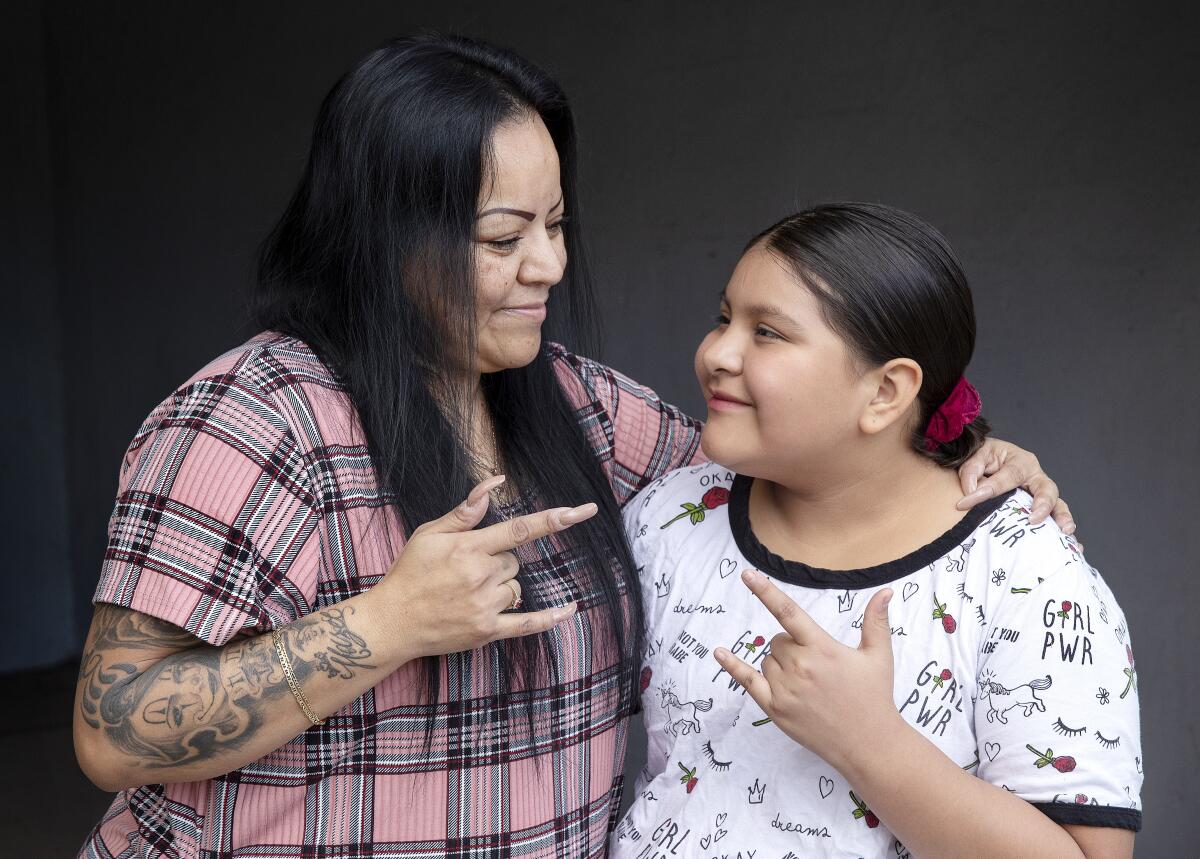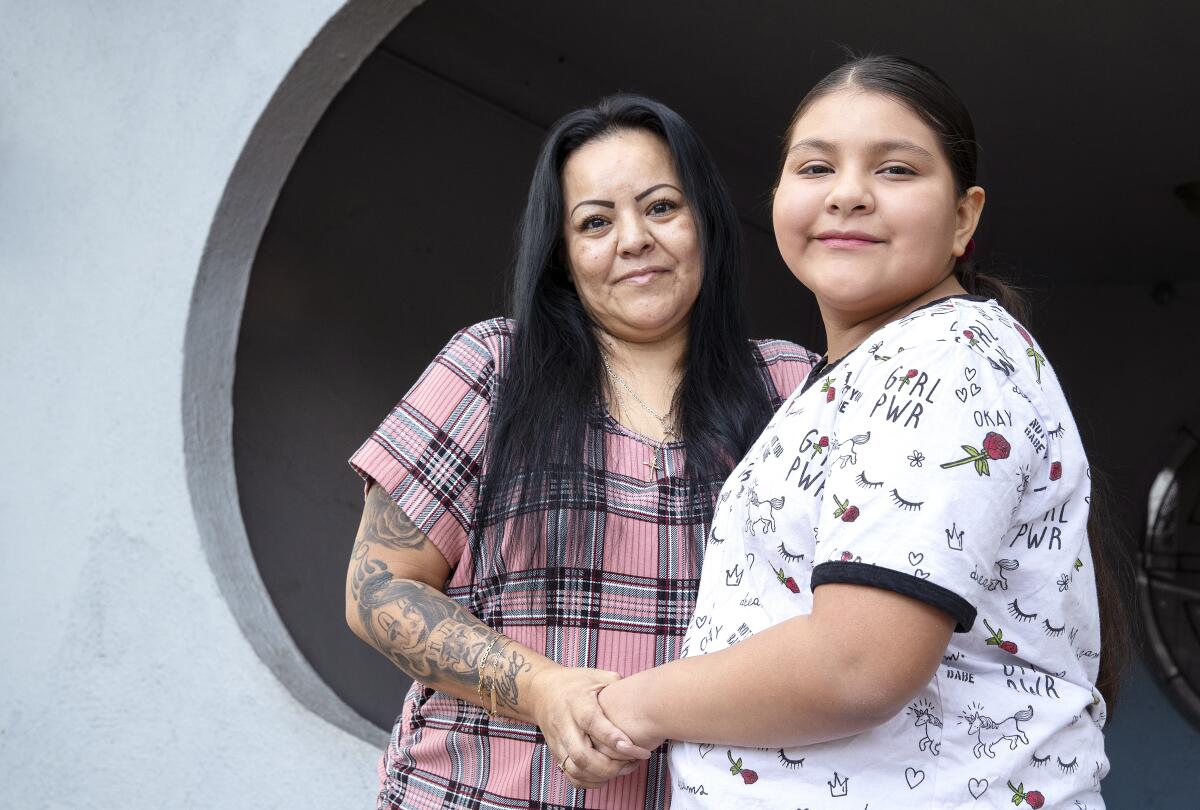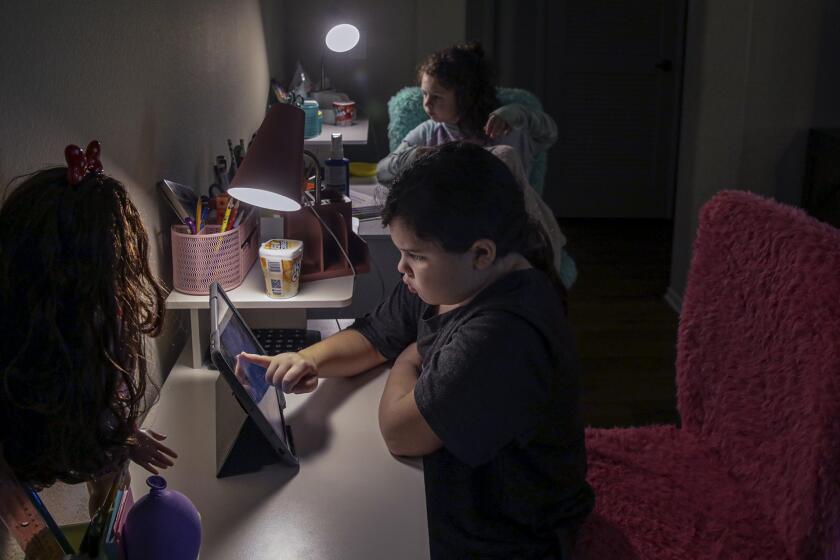LAUSD’s independent study program is overwhelmed. Students with disabilities pay the price

Maya Flores stared at her laptop screen, watching as her teacher guided classmates on how to complete online assignments.
But there was a big problem. Maya, 11, is deaf. Her teacher doesn’t know American Sign Language. For more than two months, Maya waited for a sign language interpreter to help her because she could not understand how to participate in the Los Angeles school district’s online independent study program. She began falling asleep during school hours. Eventually, she stopped logging in.
Her mother, Rena Tafoya, who has health conditions that could threaten her life if she contracts COVID-19, needed to keep Maya home and believed her daughter would receive required services, including an ASL interpreter. Maya was provided an interpreter Oct. 25, but the toll is immense, as she is weeks behind.
“It’s not fair for her, it’s not fair for any child,” Tafoya said. “They’re losing their education.”
The experience of Maya and her mother is emblematic of scores of students with disabilities enrolled in City of Angels, L.A. Unified’s independent study program. Months into the school year, many are grappling with nonexistent or slow-to-arrive accommodations and services, such as aides, interpreters and therapists, according to interviews with parents and teachers. Children like Maya are grappling with huge voids in their schooling despite federal law requiring schools to provide students with disabilities a free and appropriate public education.

From the start of the school year, City of Angels has been beset with teacher and staff shortages and ill-prepared to handle a big increase in enrollment. But the situation has been particularly alarming for many students with disabilities, who are disproportionately enrolled, making up 16% of enrollment, or about 2,600 students. Students with disabilities are 13% of the district’s total population, and many have health conditions that prevent them from attending in-person classes.
Parents were frustrated after receiving little help enrolling into LAUSD’s independent study program. The school district is not alone.
Compounding frustration, parents said, has been the lack of timely responses from administrators, leaving them in the dark for weeks about their children’s schooling. Teachers said that they too have had trouble navigating the system amid confusing and often conflicting guidelines, especially for their students with disabilities.
The independent study program existed long before the pandemic, serving about 1,000 students a year, mainly those with unique schedules, such as child actors. Students work mostly on their own, completing 30 hours of coursework independently and meeting weekly with a teacher. This option remains available.
When the state Legislature ended pandemic-forced distance learning — in which students would receive live instruction on Zoom and other online platforms — it required districts to expand independent study as the remote alternative. Districts were also required to provide more live instruction in their independent study programs. Many districts, including LAUSD, complained they did not have time to prepare for the onslaught of students.
In November, a federal judge affirmed the grievances of children with disabilities enrolled in such programs in Los Angeles and elsewhere, ordering the state to act immediately to force the districts to meet their needs. The ruling, in the form of a temporary restraining order, came after 15 families, including seven from L.A. Unified, filed suit against California, saying their children were being denied their right to an education.
“There are students who are at home not receiving any services. ... They’re not learning,” said Claudia Center, legal director at the Disability Rights Education & Defense Fund, which signed on to the lawsuit. Students involved in the suit also attend Anaheim Unified, Capistrano Unified, Long Beach Unified, San Diego Unified and San Francisco Unified school districts.
The ruling applied immediately only to students directly connected to the litigation — and it is unclear to what degree the order will extend to all with disabilities. One parent, Anjure Johnson, said the suit was the only course of action to get her daughter, Eden, access to independent study in LAUSD after the district denied her placement in the program. Eden, who has Down syndrome and other medical conditions, requires services such as an aide and occupational and speech therapy — which she received virtually last year.
“I hate that it had to go that way, but they violated her civil rights,” Johnson said.
Los Angeles school officials have not yet decided whether to extend the court order beyond the seven district students named in the lawsuit to all students with disabilities, said Shannon Haber, a district spokesperson.
City of Angels students with special education requirements are provided with services identified through individualized assessments, Haber said. But the district declined to release data about the number or percentage of students who are not receiving all of their required accommodations and services.
L.A. Unified school board member Scott Schmerelson, who chairs the special education committee, wrote in an email that he has “serious concerns” about factors out of the district’s control with City of Angels, such as scaling a once-obscure program to serve 16,000 students as an acute staff and educator shortage continues. He said in January that the committee is “planning a significant portion of the agenda … to address the question of making the City of Angels program a higher quality, and hopefully temporary, option.” His email did not offer specific actions for improvement.
“We need to make it as easy as possible for parents to work with their child’s teacher to discuss any concerns and, unfortunately, sometimes parents will have to be persistent, which should not be the case,” he said. “There is still much to be done under difficult conditions.”

Los Angeles special education teachers — including Maya’s teacher, Shawn Fornari, said they felt set up for failure after weeks of contradictory or changing directives and a lack of timely responses from administrators. Others feel highly stressed, working long hours to keep up with a disorganized program.
“With a lack of support, it’s impossible to roll [the program] out effectively,” one special education teacher said.
City of Angels Principal Vince Carbino was not available for an interview, Haber said. Carbino did not respond to requests for comment.
Some teachers feared the student vaccination mandate, which required students 12 and older to get vaccinated or enroll in independent study, would overwhelm the program. But with more than 30,000 students unvaccinated by mid-December, interim Supt. Megan Reilly proposed pushing the deadline back until fall 2022. The decision was welcomed by teachers, including Fornari.
For parents whose children are enrolled in City of Angels, the frustration begins when they reach out for help — and no one answers.
One mother, Evelyn, said she had to keep her son Gabriel in remote learning because he has autism, epilepsy and medical conditions that could make in-person instruction risky. She asked that her full name not be used to protect her family’s privacy. Gabriel needs an aide to help transcribe essays and sessions with an occupational therapist — he has not had one since campuses closed in March 2020. For months, she couldn’t reach anyone in City of Angels for help.
“I’ve left messages in different places,” said Evelyn, who is seeking a virtual aide to help him. “Crickets.”
In Maya’s case, the district said the months-long delay was due to a shortage of sign language interpreters. Tafoya, Maya’s mother, said she wishes the district had been upfront about the shortage.
Another parent, Rebecca, said that her sixth-grade son has trouble concentrating in school and that she has tried to have him assessed so that he can get support. But his school offered only an in-person assessment, which felt unsafe — her son was unvaccinated and they live with her 85-year-old grandmother. Rebecca declined and instead began to coach him through assignments.
But without specialized support, the 12-year-old struggled. His first report card came back with no grades, just rows of question marks.
“This is what I signed up for. I do have to support him, but it’s such a more ridiculous workload than it should be because City of Angels dropped the ball,” she said. Her son is now vaccinated and she is deciding whether to send him back to school in person.
After a Times reporter inquired about Evelyn’s and Rebecca’s situations, district staff members connected with the families and said support services would be provided.
Of a dozen teachers interviewed for the story, many said the program lacked a basic orientation and early training on how to adjust online platforms to meet the needs of students with disabilities, who sometimes require extra time and reduced workloads.
Training was given to all City of Angels teachers showing them how to use these accommodations in Edgenuity, the main online learning platform. But several teachers said that it came too late into the semester and that they went weeks without knowing how to help students.
Others said several of their students are failing based on the online curricula, and they’re not sure they can catch up even with extra help.
Fornari’s students are also failing. Even with extra time to improve grades, he worries they are burned out.
“My anxiety level gets high because I feel like I’m failing. ... There’s no way they can be successful so late in the game,” he said.
For families still struggling to get access to services, Maribel Luna, senior director of the LAUSD special education division, said parents can call the department for help. The number is (213) 241-6701.
More to Read
Sign up for Essential California
The most important California stories and recommendations in your inbox every morning.
You may occasionally receive promotional content from the Los Angeles Times.












